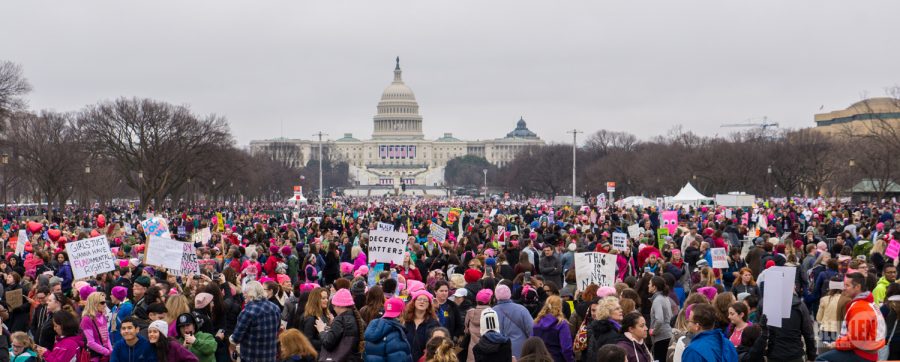Women’s march: The beginning of a new era of feminism
February 2, 2017
When the DC protests happened back in November, I wasn’t sure I supported them. I recognized their right to assemble and protest. I recognized their freedom of speech. But I couldn’t help but think that, at that point, it didn’t matter anymore. The nation had made their mind on who was to govern for the next four years; a bigot, xenophobic, homophobic man, who denied climate change and saw it appropriate to objectify women.
As the daughter of scientists who dedicate their lives to climate studies and have made decades worth of research in global warming, I feared for their profession and for the world’s fate. As someone who wants to pursue higher education in the U.S., I was afraid that my dreams wouldn’t come true. As a Latina woman and an immigrant, I was hurt. Until last weekend, when my aunt asked me if I would cover the Women’s March for her online magazine. She told me that it was supposed to be a march of 200,000 people. The idea of writing an article made me agree immediately, but I was still skeptical, bordering cynical. But on my way to Washington, I started to see the magnitude of the event.
Women, men, children, Black people, Latinos, Muslims, people with disabilities and members of the LGBTQ community covered Capitol Hill and the Washington Mall with pink hats and posters. This was the scene of the Women’s March, where red lipstick was considered war paint. But still, it was a peaceful manifestation, with acid humor and empowerment. When I go to big cities, I constantly feel trapped. In subways, I’m anxious and count the stations to my destinations like a prayer. But in that crowd surpassing half a million, I felt safe. The march proved that none of us are alone because there are people who care and will fight for us.
I talked to a middle aged couple from Alabama, two senior citizens from North Carolina, teenagers, children, a Muslim mother, a transgender woman and a Latina. But what restored my faith on the future the most was my conversation with Lucy, Kate, Nahaa, Mariki, Story, Toya and Eva. Although they were all between six and eight years old, they were aware of how important the march was. When I asked what they wished to say to Trump, Lucy promptly said “We are all equal and you can’t take that away from us.” Toya advised him to think before acting. And what made me laugh the most was when the youngest and most quiet one fiercely said, “You have no power over us.’ With a group like this, we shouldn’t be afraid of the future, but deliver it with faith to this generation.
The two previous waves of feminism in the United States marked American history with a focus on voting and property rights and on women’s entry into the labor market, reproductive rights, domestic violence, and custody and divorce laws, respectively. But the Women’s March was the first movement that, on a large scale, fought not only for women’s rights, but also the rights of the LGBT+ community, the end of racial inequality and environmental problems. It was the first movement that mirrored the purest form of the concept of feminism: the idea of equal rights among all. The Women’s March has brought hope to minorities in a world that day after day draws closer to the far right.




















































